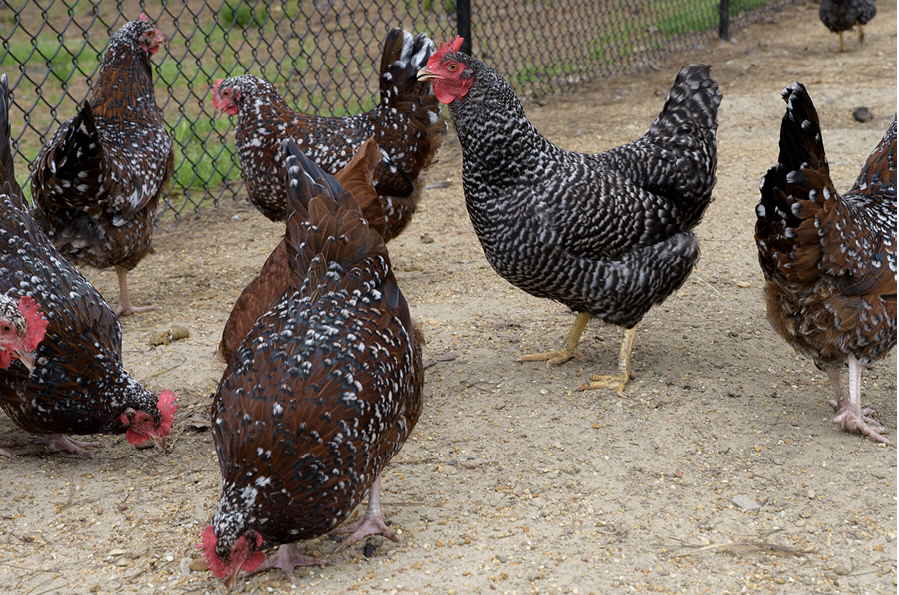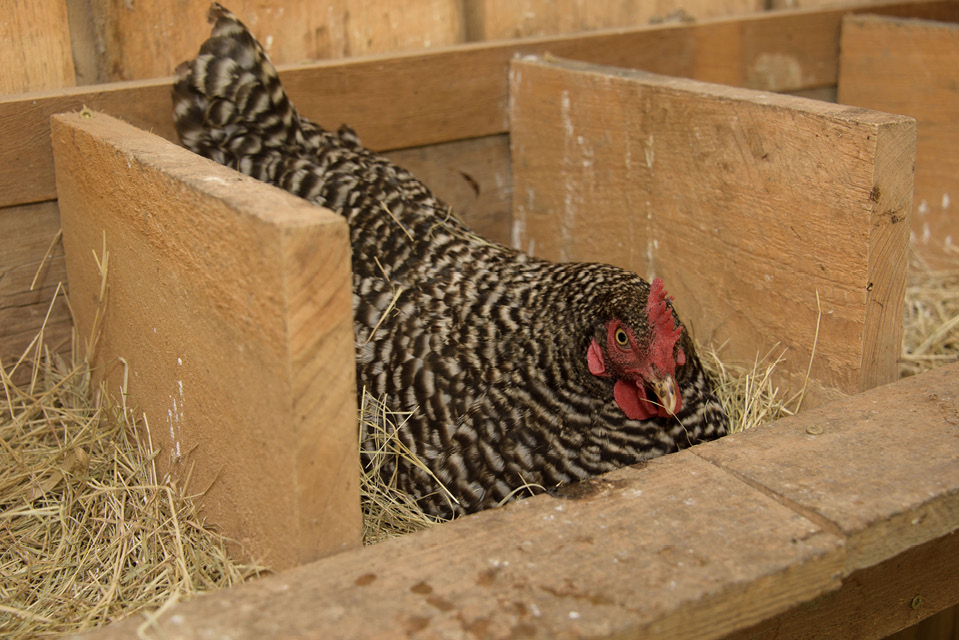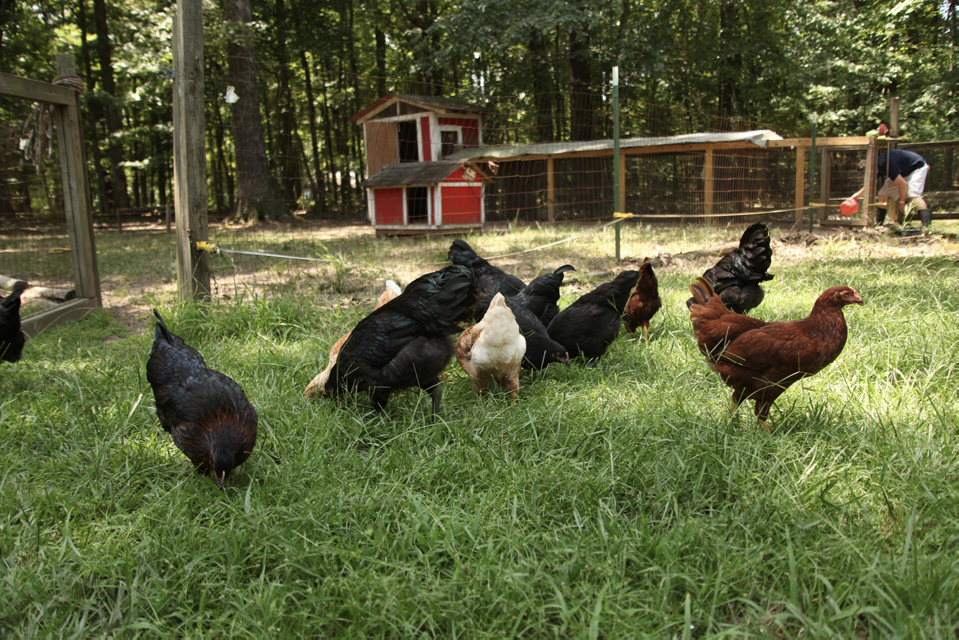Poultry and Zoonotic Diseases
Zoonotic Diseases
Raising and caring for poultry can be beneficial for numerous reasons. Whether you are raising poultry commercially for profit or as a backyard hobby or 4-H project, it’s important to be aware of zoonotic diseases. A zoonotic disease is a disease that can be transmitted to other species through an infectious agent, such as bacteria, fungus, protozoan, or virus. Don’t be too alarmed or second-guess your decision to raise poultry; zoonotic diseases pose a small risk to humans in close contact with them.

Some groups are at higher risk than others, such as elderly immunocompromised people and children, particularly ages 5 and under with underdeveloped immune systems. This publication provides best management practices you can implement into your operation to protect not only your flock but also you and your family.
There are several ways a zoonotic disease can spread to humans. One way is direct contact with an infected chicken. Picking up, petting, or touching, as well as being accidentally scratched or bitten by an infected bird, are all ways you could be infected. Another more common way is foodborne infection caused by consuming improperly prepared food, meat, and eggs from infected chickens. Foodborne illness can also come from foods contaminated with infected poultry waste.
You could also get sick from encountering or handling any object in the poultry environment, such as equipment, housing, eggs, soil, bedding material, and manure of an infected bird.
Although less common, it is possible to contract the illness from the bites of vectors such as fleas, ticks, or mosquitoes that have been in contact with an infected bird.
A prime example of a zoonotic disease that can infect humans is salmonella. A recent multistate salmonella outbreak, linked to backyard poultry, infected more than 100 people from 29 states. With backyard poultry gaining popularity and taking off during the COVID years, more and more people are choosing to raise poultry as a hobby. New growers with limited training may be a cause of the spike in salmonella cases.
Most salmonella infections are traditionally caused by foodborne illness, but salmonella naturally occurs in poultry microflora and can be spread by contact. Some strains of salmonella are commonly found in turkeys, ducks, and chickens, but you can protect yourself and others through simple measures.
Prevent Disease Spread
It is recommended to source your poultry through a dealer or hatchery that is certified by the National Poultry Improvement Plan (NPIP). An NPIP certification ensures the chicks you purchase are healthy and disease-free.
This helps you start with a good foundation when establishing a new flock or introducing new birds to an existing flock. Before introducing new arrivals into an existing flock, quarantine them by placing them in a separate containment area away from the flock for at least 4 weeks.

Biosecurity
A critical part of keeping your flock healthy is establishing a good biosecurity plan on your farm. In short, bio- means “life,” and security means “protection,” so you are setting measures to keep your flock safe and disease-free, as well as containing any disease should your birds become sick. Unwanted pathogens could be spread by having visitors on your farm or by visiting other farms. It is recommended to limit outside traffic to necessary visitors only.
Select dedicated footwear and clothing that will only be worn to the chicken coop to help limit pathogen spread; always leave these outside your home. Using a disinfecting foot pan when entering and exiting the house/coop area will also add a level of protection.
If you borrow equipment, be sure to clean and disinfect it before bringing it onto your farm, and always clean equipment outside the home. After handling birds and eggs or working in the barnyard where they frequent, wash your hands with soap and water. Using hand sanitizer is also helpful. A good biosecurity program will help keep both your flock and your family safe.
Poultry Are Livestock
Although your poultry may be pets and loved by the family, they are ultimately livestock and belong outside on the farm; never bring your poultry inside the house where you live. It is recommended not to hug and kiss your birds. Refrain from eating and drinking while around your flock.

If you have children, make sure you supervise and teach them proper sanitation techniques to help keep them safe; children ages 5 and under should not handle poultry as they are more likely to touch their face and mouth and become sick.
Getting children involved in 4-H poultry programs is a great way to increase their knowledge and skills. And, be sure to explain to children the importance of washing their hands well and often.
Food Safety
Proper food handling and preparation techniques are also critical in preventing foodborne illnesses. It is recommended not to wash raw chicken before cooking because this could spread bacteria around your sink area in the kitchen. Cook chicken until it reaches an internal temperature of 165ºF; this will kill any pathogens that could be present on or in the meat.
When collecting eggs, inspect and discard any with cracks. Cracks can more easily allow pathogens to enter the egg. Brush or wipe eggs with a cloth or sandpaper to clean and remove dirt and debris. Do not wash eggs with cold water as it can cause pathogens to be pulled into the egg.
To kill pathogens in egg dishes, cook them to an internal temperature of at least 160ºF (egg yolks and whites should be firm). Again, always wash your hands with soap and water before and after handling raw chicken and eggs.
Summary
Raising chickens can be fun and enjoyable for the entire family, but you should take necessary precautions to help keep your birds and yourself safe and healthy. Start your flock with healthy NPIP-certified chicks, and keep them healthy by using good biosecurity practices. Though you may love your poultry, don’t get too close or you’ll potentially bring pathogens into your home. Monitor your children and teach them to use safe handling and sanitation techniques, such as frequent handwashing.
When preparing poultry dishes, be sure to cook foods safely and properly to the appropriate internal temperature to kill pathogens. If you take these few simple measures, you can enjoy your poultry and help keep everyone safe in the process.
Publication 4031 (POD-08-24)
By Jonathan Moon, Extension Instructor, Tannah Christensen, Extension Instructor, and Jessica Wells, PhD, Assistant Teaching Professor, Poultry Science.
The Mississippi State University Extension Service is working to ensure all web content is accessible to all users. If you need assistance accessing any of our content, please email the webteam or call 662-325-2262.





